Federation University BUMGT5970 Leadership Roles Essay: PM & Coach
VerifiedAdded on 2023/06/09
|7
|2099
|452
Essay
AI Summary
This essay delves into the multifaceted nature of leadership by contrasting the roles of a Prime Minister and a sports coach. It explores the distinct responsibilities and skill sets required for each position, highlighting the importance of communication, decision-making, and the ability to motivate and influence others. The essay analyzes the Prime Minister's role in representing a nation, making strategic decisions, and managing various societal challenges, while also examining the sports coach's role in building a team, fostering collaboration, and developing individual players. Furthermore, the essay emphasizes the importance of adaptability, long-term vision, and the ability to handle criticism and unforeseen circumstances in both leadership contexts. Ultimately, the essay underscores the crucial role of effective leadership in achieving organizational and national goals.
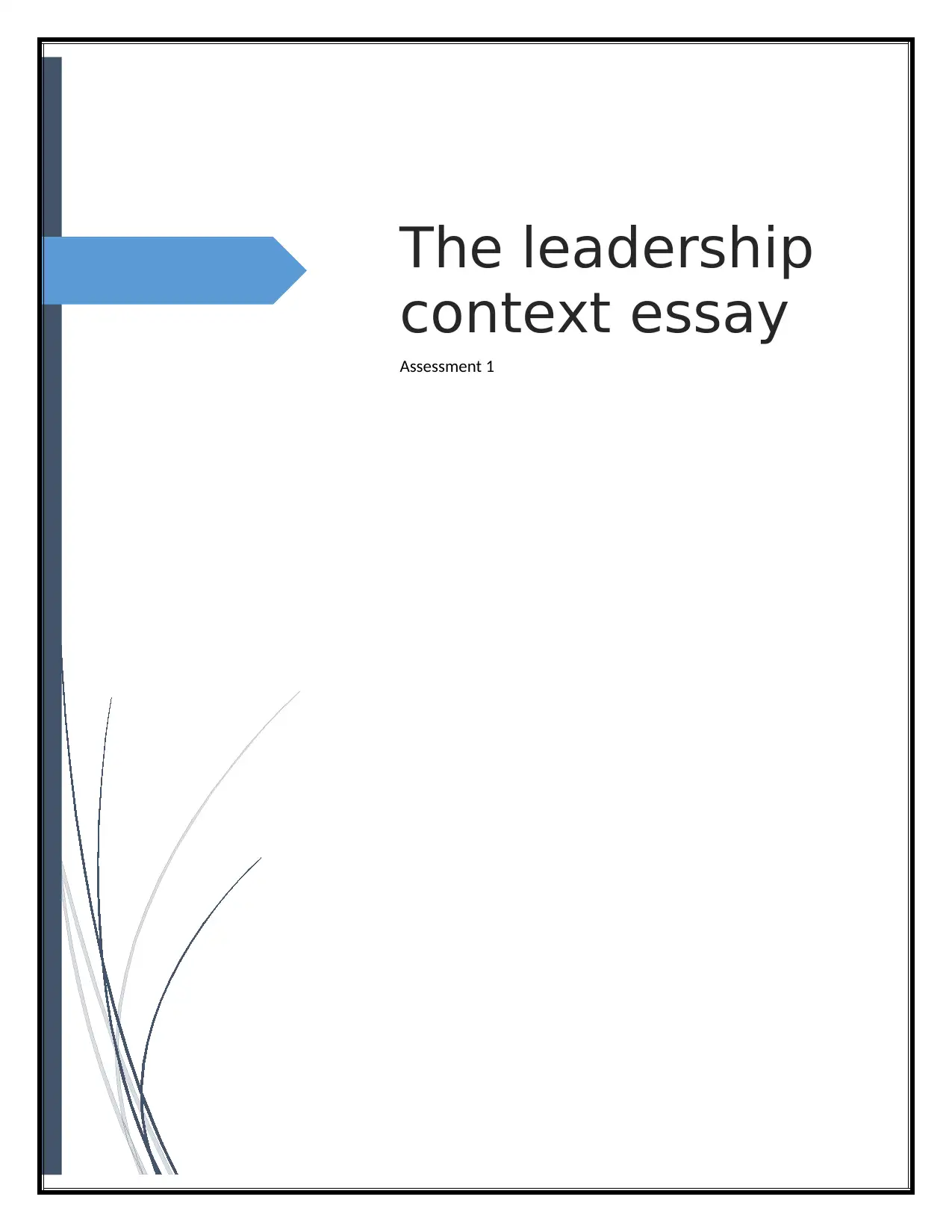
The leadership
context essay
Assessment 1
context essay
Assessment 1
Paraphrase This Document
Need a fresh take? Get an instant paraphrase of this document with our AI Paraphraser
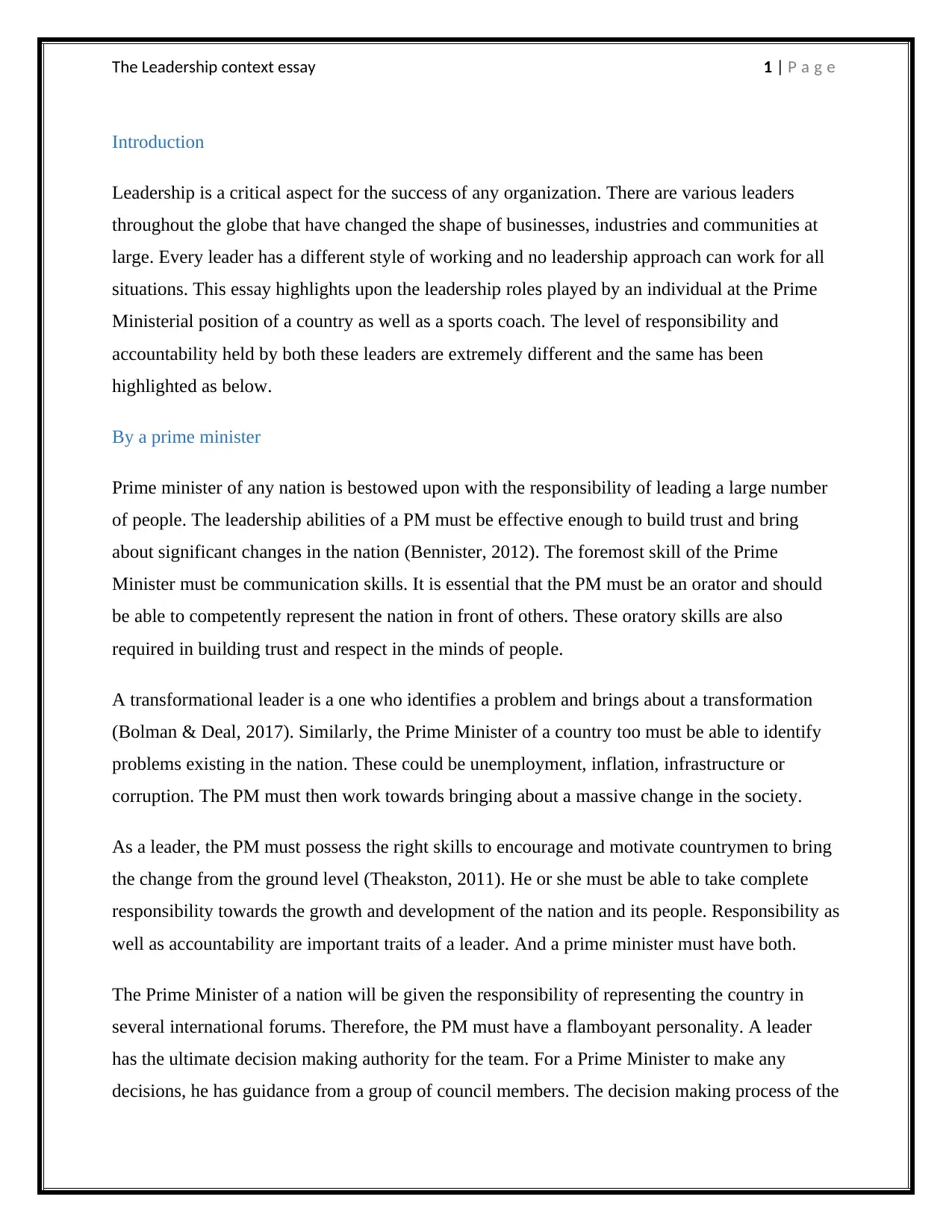
The Leadership context essay 1 | P a g e
Introduction
Leadership is a critical aspect for the success of any organization. There are various leaders
throughout the globe that have changed the shape of businesses, industries and communities at
large. Every leader has a different style of working and no leadership approach can work for all
situations. This essay highlights upon the leadership roles played by an individual at the Prime
Ministerial position of a country as well as a sports coach. The level of responsibility and
accountability held by both these leaders are extremely different and the same has been
highlighted as below.
By a prime minister
Prime minister of any nation is bestowed upon with the responsibility of leading a large number
of people. The leadership abilities of a PM must be effective enough to build trust and bring
about significant changes in the nation (Bennister, 2012). The foremost skill of the Prime
Minister must be communication skills. It is essential that the PM must be an orator and should
be able to competently represent the nation in front of others. These oratory skills are also
required in building trust and respect in the minds of people.
A transformational leader is a one who identifies a problem and brings about a transformation
(Bolman & Deal, 2017). Similarly, the Prime Minister of a country too must be able to identify
problems existing in the nation. These could be unemployment, inflation, infrastructure or
corruption. The PM must then work towards bringing about a massive change in the society.
As a leader, the PM must possess the right skills to encourage and motivate countrymen to bring
the change from the ground level (Theakston, 2011). He or she must be able to take complete
responsibility towards the growth and development of the nation and its people. Responsibility as
well as accountability are important traits of a leader. And a prime minister must have both.
The Prime Minister of a nation will be given the responsibility of representing the country in
several international forums. Therefore, the PM must have a flamboyant personality. A leader
has the ultimate decision making authority for the team. For a Prime Minister to make any
decisions, he has guidance from a group of council members. The decision making process of the
Introduction
Leadership is a critical aspect for the success of any organization. There are various leaders
throughout the globe that have changed the shape of businesses, industries and communities at
large. Every leader has a different style of working and no leadership approach can work for all
situations. This essay highlights upon the leadership roles played by an individual at the Prime
Ministerial position of a country as well as a sports coach. The level of responsibility and
accountability held by both these leaders are extremely different and the same has been
highlighted as below.
By a prime minister
Prime minister of any nation is bestowed upon with the responsibility of leading a large number
of people. The leadership abilities of a PM must be effective enough to build trust and bring
about significant changes in the nation (Bennister, 2012). The foremost skill of the Prime
Minister must be communication skills. It is essential that the PM must be an orator and should
be able to competently represent the nation in front of others. These oratory skills are also
required in building trust and respect in the minds of people.
A transformational leader is a one who identifies a problem and brings about a transformation
(Bolman & Deal, 2017). Similarly, the Prime Minister of a country too must be able to identify
problems existing in the nation. These could be unemployment, inflation, infrastructure or
corruption. The PM must then work towards bringing about a massive change in the society.
As a leader, the PM must possess the right skills to encourage and motivate countrymen to bring
the change from the ground level (Theakston, 2011). He or she must be able to take complete
responsibility towards the growth and development of the nation and its people. Responsibility as
well as accountability are important traits of a leader. And a prime minister must have both.
The Prime Minister of a nation will be given the responsibility of representing the country in
several international forums. Therefore, the PM must have a flamboyant personality. A leader
has the ultimate decision making authority for the team. For a Prime Minister to make any
decisions, he has guidance from a group of council members. The decision making process of the
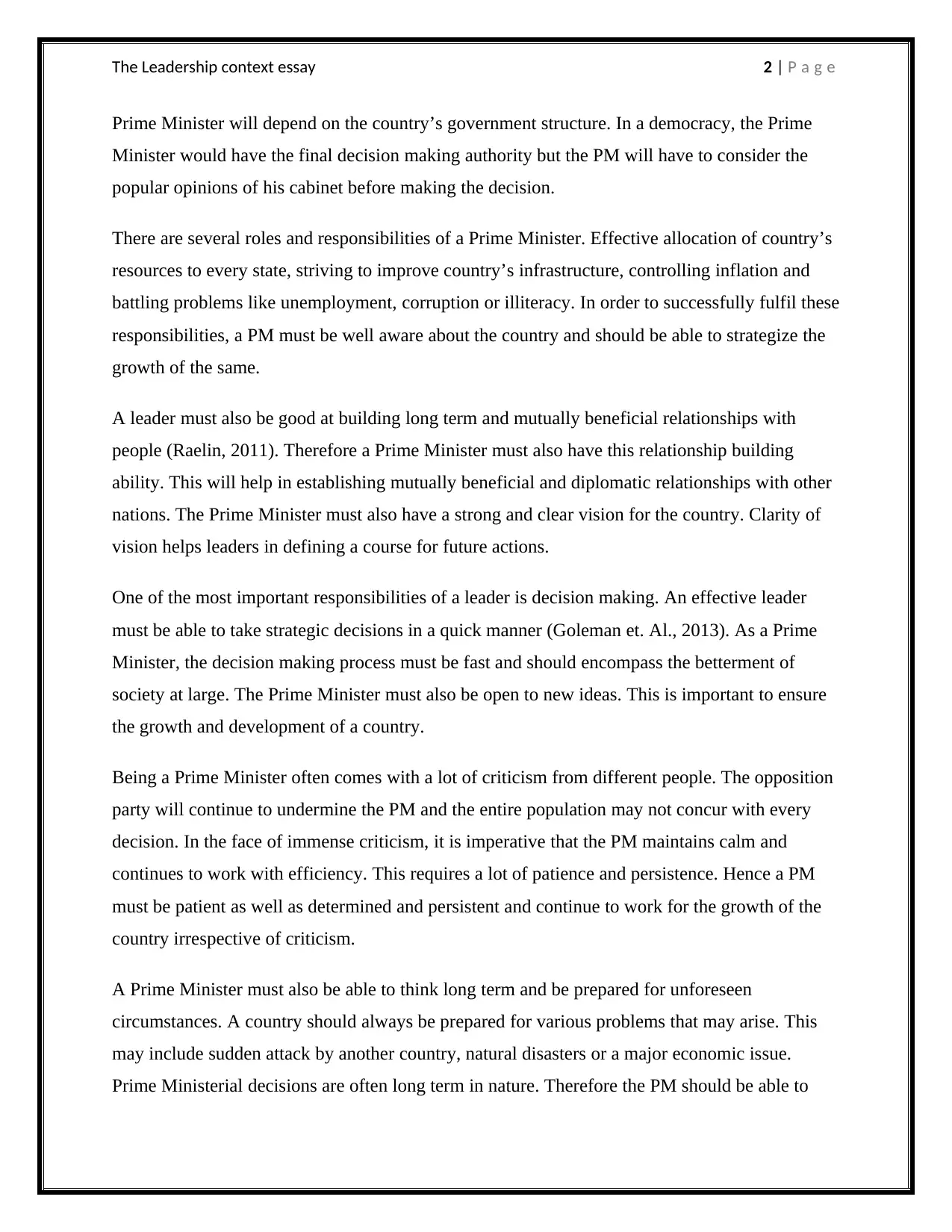
The Leadership context essay 2 | P a g e
Prime Minister will depend on the country’s government structure. In a democracy, the Prime
Minister would have the final decision making authority but the PM will have to consider the
popular opinions of his cabinet before making the decision.
There are several roles and responsibilities of a Prime Minister. Effective allocation of country’s
resources to every state, striving to improve country’s infrastructure, controlling inflation and
battling problems like unemployment, corruption or illiteracy. In order to successfully fulfil these
responsibilities, a PM must be well aware about the country and should be able to strategize the
growth of the same.
A leader must also be good at building long term and mutually beneficial relationships with
people (Raelin, 2011). Therefore a Prime Minister must also have this relationship building
ability. This will help in establishing mutually beneficial and diplomatic relationships with other
nations. The Prime Minister must also have a strong and clear vision for the country. Clarity of
vision helps leaders in defining a course for future actions.
One of the most important responsibilities of a leader is decision making. An effective leader
must be able to take strategic decisions in a quick manner (Goleman et. Al., 2013). As a Prime
Minister, the decision making process must be fast and should encompass the betterment of
society at large. The Prime Minister must also be open to new ideas. This is important to ensure
the growth and development of a country.
Being a Prime Minister often comes with a lot of criticism from different people. The opposition
party will continue to undermine the PM and the entire population may not concur with every
decision. In the face of immense criticism, it is imperative that the PM maintains calm and
continues to work with efficiency. This requires a lot of patience and persistence. Hence a PM
must be patient as well as determined and persistent and continue to work for the growth of the
country irrespective of criticism.
A Prime Minister must also be able to think long term and be prepared for unforeseen
circumstances. A country should always be prepared for various problems that may arise. This
may include sudden attack by another country, natural disasters or a major economic issue.
Prime Ministerial decisions are often long term in nature. Therefore the PM should be able to
Prime Minister will depend on the country’s government structure. In a democracy, the Prime
Minister would have the final decision making authority but the PM will have to consider the
popular opinions of his cabinet before making the decision.
There are several roles and responsibilities of a Prime Minister. Effective allocation of country’s
resources to every state, striving to improve country’s infrastructure, controlling inflation and
battling problems like unemployment, corruption or illiteracy. In order to successfully fulfil these
responsibilities, a PM must be well aware about the country and should be able to strategize the
growth of the same.
A leader must also be good at building long term and mutually beneficial relationships with
people (Raelin, 2011). Therefore a Prime Minister must also have this relationship building
ability. This will help in establishing mutually beneficial and diplomatic relationships with other
nations. The Prime Minister must also have a strong and clear vision for the country. Clarity of
vision helps leaders in defining a course for future actions.
One of the most important responsibilities of a leader is decision making. An effective leader
must be able to take strategic decisions in a quick manner (Goleman et. Al., 2013). As a Prime
Minister, the decision making process must be fast and should encompass the betterment of
society at large. The Prime Minister must also be open to new ideas. This is important to ensure
the growth and development of a country.
Being a Prime Minister often comes with a lot of criticism from different people. The opposition
party will continue to undermine the PM and the entire population may not concur with every
decision. In the face of immense criticism, it is imperative that the PM maintains calm and
continues to work with efficiency. This requires a lot of patience and persistence. Hence a PM
must be patient as well as determined and persistent and continue to work for the growth of the
country irrespective of criticism.
A Prime Minister must also be able to think long term and be prepared for unforeseen
circumstances. A country should always be prepared for various problems that may arise. This
may include sudden attack by another country, natural disasters or a major economic issue.
Prime Ministerial decisions are often long term in nature. Therefore the PM should be able to
⊘ This is a preview!⊘
Do you want full access?
Subscribe today to unlock all pages.

Trusted by 1+ million students worldwide
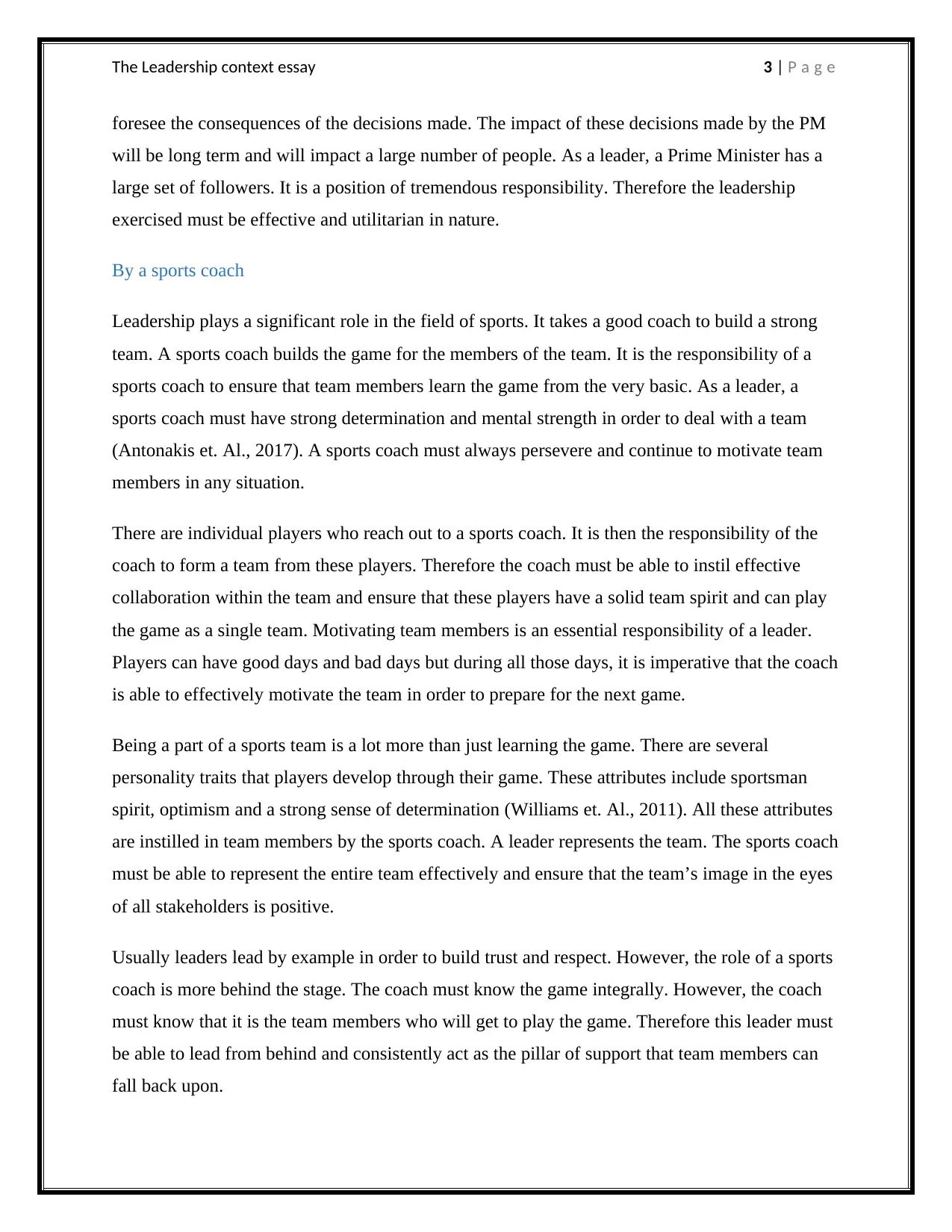
The Leadership context essay 3 | P a g e
foresee the consequences of the decisions made. The impact of these decisions made by the PM
will be long term and will impact a large number of people. As a leader, a Prime Minister has a
large set of followers. It is a position of tremendous responsibility. Therefore the leadership
exercised must be effective and utilitarian in nature.
By a sports coach
Leadership plays a significant role in the field of sports. It takes a good coach to build a strong
team. A sports coach builds the game for the members of the team. It is the responsibility of a
sports coach to ensure that team members learn the game from the very basic. As a leader, a
sports coach must have strong determination and mental strength in order to deal with a team
(Antonakis et. Al., 2017). A sports coach must always persevere and continue to motivate team
members in any situation.
There are individual players who reach out to a sports coach. It is then the responsibility of the
coach to form a team from these players. Therefore the coach must be able to instil effective
collaboration within the team and ensure that these players have a solid team spirit and can play
the game as a single team. Motivating team members is an essential responsibility of a leader.
Players can have good days and bad days but during all those days, it is imperative that the coach
is able to effectively motivate the team in order to prepare for the next game.
Being a part of a sports team is a lot more than just learning the game. There are several
personality traits that players develop through their game. These attributes include sportsman
spirit, optimism and a strong sense of determination (Williams et. Al., 2011). All these attributes
are instilled in team members by the sports coach. A leader represents the team. The sports coach
must be able to represent the entire team effectively and ensure that the team’s image in the eyes
of all stakeholders is positive.
Usually leaders lead by example in order to build trust and respect. However, the role of a sports
coach is more behind the stage. The coach must know the game integrally. However, the coach
must know that it is the team members who will get to play the game. Therefore this leader must
be able to lead from behind and consistently act as the pillar of support that team members can
fall back upon.
foresee the consequences of the decisions made. The impact of these decisions made by the PM
will be long term and will impact a large number of people. As a leader, a Prime Minister has a
large set of followers. It is a position of tremendous responsibility. Therefore the leadership
exercised must be effective and utilitarian in nature.
By a sports coach
Leadership plays a significant role in the field of sports. It takes a good coach to build a strong
team. A sports coach builds the game for the members of the team. It is the responsibility of a
sports coach to ensure that team members learn the game from the very basic. As a leader, a
sports coach must have strong determination and mental strength in order to deal with a team
(Antonakis et. Al., 2017). A sports coach must always persevere and continue to motivate team
members in any situation.
There are individual players who reach out to a sports coach. It is then the responsibility of the
coach to form a team from these players. Therefore the coach must be able to instil effective
collaboration within the team and ensure that these players have a solid team spirit and can play
the game as a single team. Motivating team members is an essential responsibility of a leader.
Players can have good days and bad days but during all those days, it is imperative that the coach
is able to effectively motivate the team in order to prepare for the next game.
Being a part of a sports team is a lot more than just learning the game. There are several
personality traits that players develop through their game. These attributes include sportsman
spirit, optimism and a strong sense of determination (Williams et. Al., 2011). All these attributes
are instilled in team members by the sports coach. A leader represents the team. The sports coach
must be able to represent the entire team effectively and ensure that the team’s image in the eyes
of all stakeholders is positive.
Usually leaders lead by example in order to build trust and respect. However, the role of a sports
coach is more behind the stage. The coach must know the game integrally. However, the coach
must know that it is the team members who will get to play the game. Therefore this leader must
be able to lead from behind and consistently act as the pillar of support that team members can
fall back upon.
Paraphrase This Document
Need a fresh take? Get an instant paraphrase of this document with our AI Paraphraser
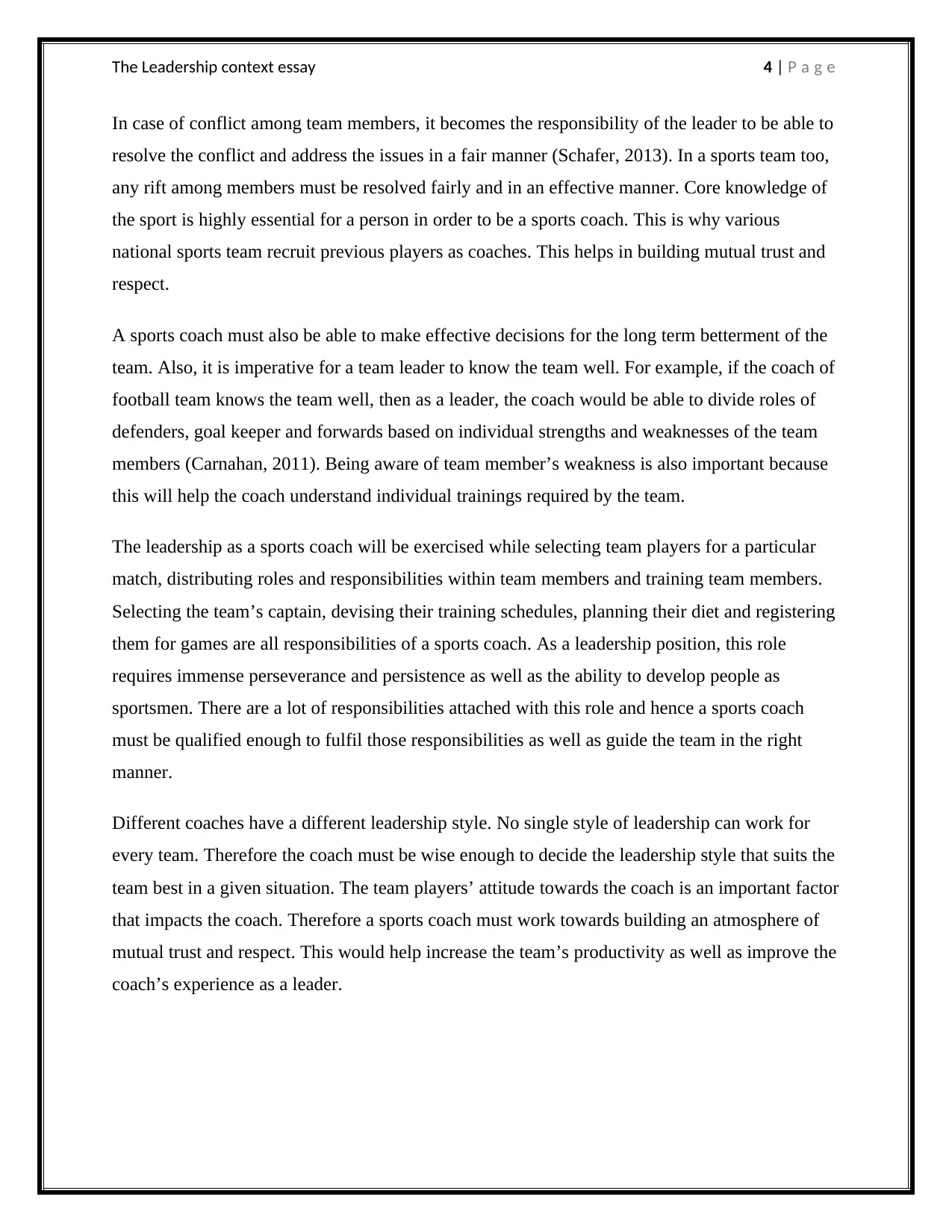
The Leadership context essay 4 | P a g e
In case of conflict among team members, it becomes the responsibility of the leader to be able to
resolve the conflict and address the issues in a fair manner (Schafer, 2013). In a sports team too,
any rift among members must be resolved fairly and in an effective manner. Core knowledge of
the sport is highly essential for a person in order to be a sports coach. This is why various
national sports team recruit previous players as coaches. This helps in building mutual trust and
respect.
A sports coach must also be able to make effective decisions for the long term betterment of the
team. Also, it is imperative for a team leader to know the team well. For example, if the coach of
football team knows the team well, then as a leader, the coach would be able to divide roles of
defenders, goal keeper and forwards based on individual strengths and weaknesses of the team
members (Carnahan, 2011). Being aware of team member’s weakness is also important because
this will help the coach understand individual trainings required by the team.
The leadership as a sports coach will be exercised while selecting team players for a particular
match, distributing roles and responsibilities within team members and training team members.
Selecting the team’s captain, devising their training schedules, planning their diet and registering
them for games are all responsibilities of a sports coach. As a leadership position, this role
requires immense perseverance and persistence as well as the ability to develop people as
sportsmen. There are a lot of responsibilities attached with this role and hence a sports coach
must be qualified enough to fulfil those responsibilities as well as guide the team in the right
manner.
Different coaches have a different leadership style. No single style of leadership can work for
every team. Therefore the coach must be wise enough to decide the leadership style that suits the
team best in a given situation. The team players’ attitude towards the coach is an important factor
that impacts the coach. Therefore a sports coach must work towards building an atmosphere of
mutual trust and respect. This would help increase the team’s productivity as well as improve the
coach’s experience as a leader.
In case of conflict among team members, it becomes the responsibility of the leader to be able to
resolve the conflict and address the issues in a fair manner (Schafer, 2013). In a sports team too,
any rift among members must be resolved fairly and in an effective manner. Core knowledge of
the sport is highly essential for a person in order to be a sports coach. This is why various
national sports team recruit previous players as coaches. This helps in building mutual trust and
respect.
A sports coach must also be able to make effective decisions for the long term betterment of the
team. Also, it is imperative for a team leader to know the team well. For example, if the coach of
football team knows the team well, then as a leader, the coach would be able to divide roles of
defenders, goal keeper and forwards based on individual strengths and weaknesses of the team
members (Carnahan, 2011). Being aware of team member’s weakness is also important because
this will help the coach understand individual trainings required by the team.
The leadership as a sports coach will be exercised while selecting team players for a particular
match, distributing roles and responsibilities within team members and training team members.
Selecting the team’s captain, devising their training schedules, planning their diet and registering
them for games are all responsibilities of a sports coach. As a leadership position, this role
requires immense perseverance and persistence as well as the ability to develop people as
sportsmen. There are a lot of responsibilities attached with this role and hence a sports coach
must be qualified enough to fulfil those responsibilities as well as guide the team in the right
manner.
Different coaches have a different leadership style. No single style of leadership can work for
every team. Therefore the coach must be wise enough to decide the leadership style that suits the
team best in a given situation. The team players’ attitude towards the coach is an important factor
that impacts the coach. Therefore a sports coach must work towards building an atmosphere of
mutual trust and respect. This would help increase the team’s productivity as well as improve the
coach’s experience as a leader.
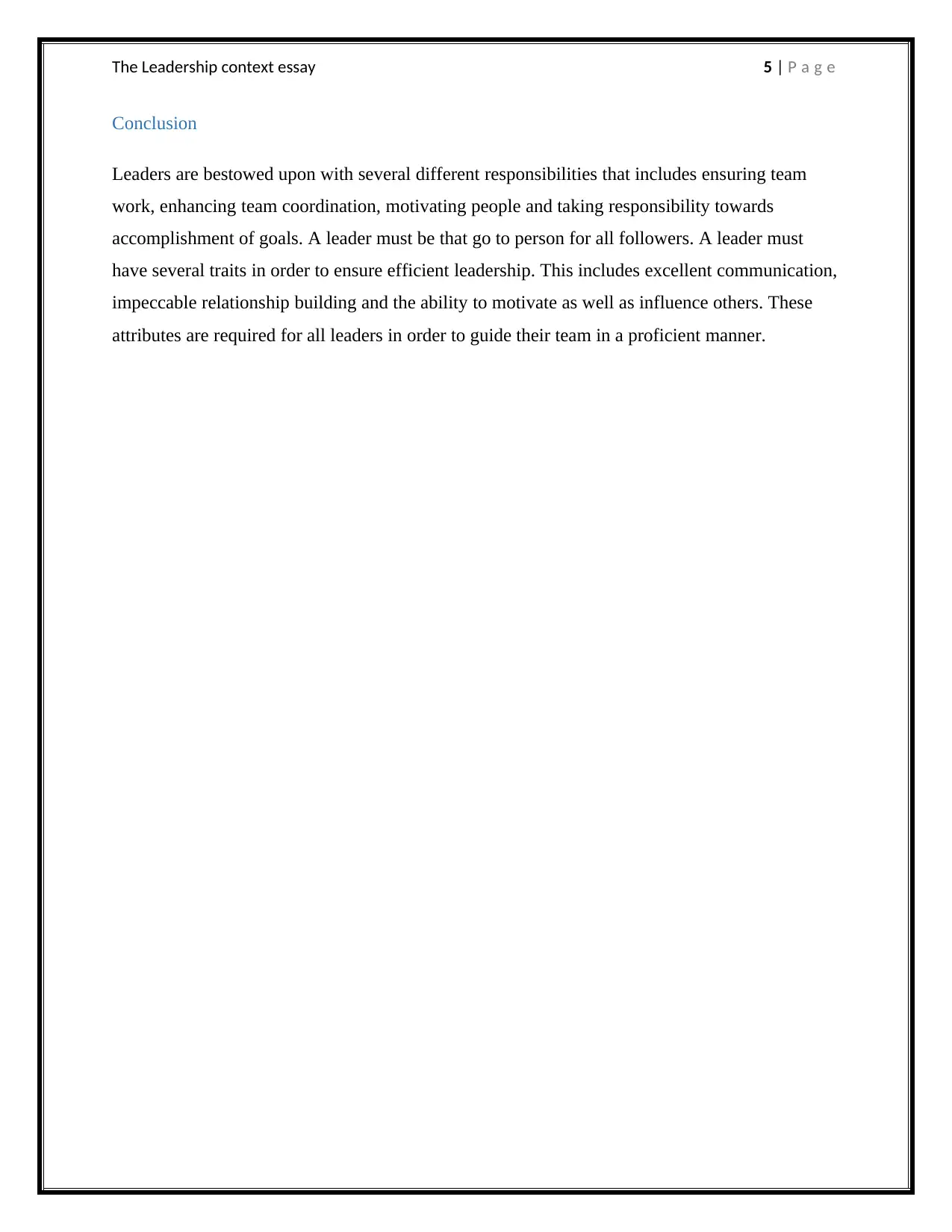
The Leadership context essay 5 | P a g e
Conclusion
Leaders are bestowed upon with several different responsibilities that includes ensuring team
work, enhancing team coordination, motivating people and taking responsibility towards
accomplishment of goals. A leader must be that go to person for all followers. A leader must
have several traits in order to ensure efficient leadership. This includes excellent communication,
impeccable relationship building and the ability to motivate as well as influence others. These
attributes are required for all leaders in order to guide their team in a proficient manner.
Conclusion
Leaders are bestowed upon with several different responsibilities that includes ensuring team
work, enhancing team coordination, motivating people and taking responsibility towards
accomplishment of goals. A leader must be that go to person for all followers. A leader must
have several traits in order to ensure efficient leadership. This includes excellent communication,
impeccable relationship building and the ability to motivate as well as influence others. These
attributes are required for all leaders in order to guide their team in a proficient manner.
⊘ This is a preview!⊘
Do you want full access?
Subscribe today to unlock all pages.

Trusted by 1+ million students worldwide
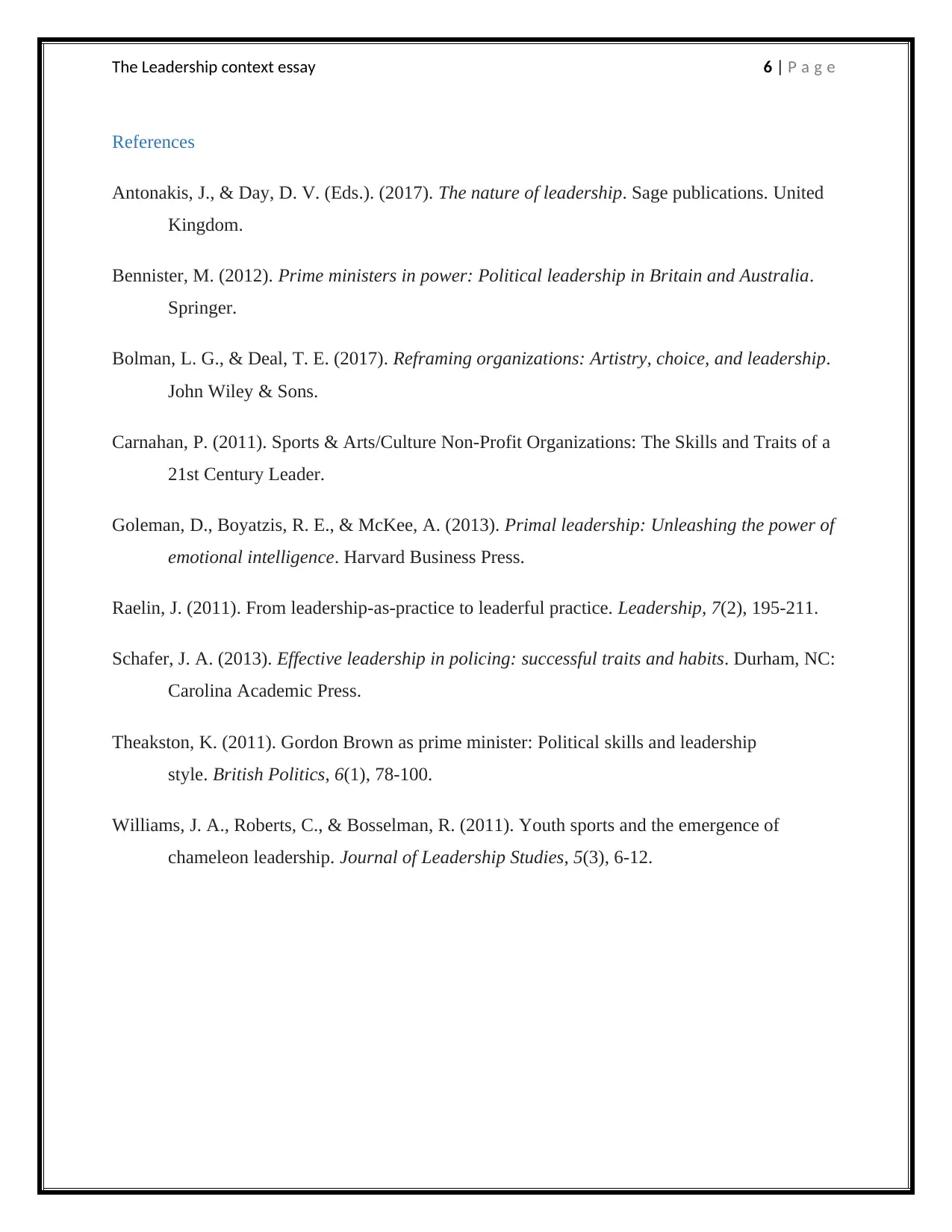
The Leadership context essay 6 | P a g e
References
Antonakis, J., & Day, D. V. (Eds.). (2017). The nature of leadership. Sage publications. United
Kingdom.
Bennister, M. (2012). Prime ministers in power: Political leadership in Britain and Australia.
Springer.
Bolman, L. G., & Deal, T. E. (2017). Reframing organizations: Artistry, choice, and leadership.
John Wiley & Sons.
Carnahan, P. (2011). Sports & Arts/Culture Non-Profit Organizations: The Skills and Traits of a
21st Century Leader.
Goleman, D., Boyatzis, R. E., & McKee, A. (2013). Primal leadership: Unleashing the power of
emotional intelligence. Harvard Business Press.
Raelin, J. (2011). From leadership-as-practice to leaderful practice. Leadership, 7(2), 195-211.
Schafer, J. A. (2013). Effective leadership in policing: successful traits and habits. Durham, NC:
Carolina Academic Press.
Theakston, K. (2011). Gordon Brown as prime minister: Political skills and leadership
style. British Politics, 6(1), 78-100.
Williams, J. A., Roberts, C., & Bosselman, R. (2011). Youth sports and the emergence of
chameleon leadership. Journal of Leadership Studies, 5(3), 6-12.
References
Antonakis, J., & Day, D. V. (Eds.). (2017). The nature of leadership. Sage publications. United
Kingdom.
Bennister, M. (2012). Prime ministers in power: Political leadership in Britain and Australia.
Springer.
Bolman, L. G., & Deal, T. E. (2017). Reframing organizations: Artistry, choice, and leadership.
John Wiley & Sons.
Carnahan, P. (2011). Sports & Arts/Culture Non-Profit Organizations: The Skills and Traits of a
21st Century Leader.
Goleman, D., Boyatzis, R. E., & McKee, A. (2013). Primal leadership: Unleashing the power of
emotional intelligence. Harvard Business Press.
Raelin, J. (2011). From leadership-as-practice to leaderful practice. Leadership, 7(2), 195-211.
Schafer, J. A. (2013). Effective leadership in policing: successful traits and habits. Durham, NC:
Carolina Academic Press.
Theakston, K. (2011). Gordon Brown as prime minister: Political skills and leadership
style. British Politics, 6(1), 78-100.
Williams, J. A., Roberts, C., & Bosselman, R. (2011). Youth sports and the emergence of
chameleon leadership. Journal of Leadership Studies, 5(3), 6-12.
1 out of 7
Related Documents
Your All-in-One AI-Powered Toolkit for Academic Success.
+13062052269
info@desklib.com
Available 24*7 on WhatsApp / Email
![[object Object]](/_next/static/media/star-bottom.7253800d.svg)
Unlock your academic potential
Copyright © 2020–2025 A2Z Services. All Rights Reserved. Developed and managed by ZUCOL.





